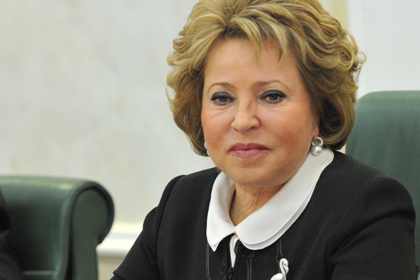Women from the top: the most influential Russian woman according to Forbes
'17.09.2018'
Source: Forbes Russia
In the list of influential Russians 100 only four women. Who are they and what is their power? Career stories of Elvira Nabiullina, Natalia Komarova, Tatyana Golikova and Valentina Matvienko - the most influential women in Russia according to Forbes, Prove that anyone can become anyone, the main thing - the desire and hard work.

All of them were born in the families of ordinary workers, employees of the public sector, but this did not prevent them from getting a good education, build a political career, and have a serious impact on the fate of the country.
Nabiullina
Chairman of the Bank of Russia
54, Moscow, married son
Ranking place: 7
The future politician was born in a family of simple Soviet workers: Zuleikha’s mother worked as an apprentice at a factory, and Sakipzad’s father — a chauffeur at a motor depot. In school, Nabiullina studied on the same five, however, the gold medal was not honored. As she explains herself, there were not enough medals at all. But this did not prevent the young girl from enrolling in one of the most prestigious universities in the country - the Moscow State University named after M.V. Lomonosov. She chose the future faculty and profession by chance. In the MSU admissions office hung a list of all the departments, having carefully studied it, the girl came across a new and unknown for her “economics” direction and decided to try her hand there. The random choice has become momentous. Nabiullina quickly settled into an unfamiliar area for her.
She graduated from the university with honors, but did not hurry to go to work - she decided to continue her studies in graduate school. By the way, she did not defend her PhD thesis, but she acquired two important acquaintances while studying there: with Yaroslav Kuzminov, a teacher at the Department of Economic History and Economic Studies, who soon became her husband, and Professor Yevgeny Yasin, who is considered to be a mentor and ideological mastermind Nabiullina. Their professional tandem will continue in the Scientific Industrial Union (NPS) of the USSR on the economic reform board, where Nabiullina will study the processes of economic restructuring of the country and help the head of the institute Yasin in preparing reforms. Two years later, the Union will be renamed, and after two more Nabiullina will leave the post of adviser to the Expert Institute of the Russian Union of Industrialists and Entrepreneurs and will be transferred to the Ministry of Economics.
The career of a talented economist developed rapidly, over the four years of work there, she grew from the position of deputy head of the economic reform department to the Deputy Minister of Economy of the Russian Federation, and then went to work in the private sector to Promtorgbank, but not for long.
The next important meeting in her career will be acquaintance with German Gref. Under his leadership, Nabiullina will work at the Center for Strategic Research (CSR), a think tank that develops a development strategy for our country; and after Gref’s appointment as Minister of Economic Development and Trade, he will return to the civil service and become his first deputy. Nabiullina left the civil service several times, but she still returned. During her professional career she managed to be in the position of Minister of Economy of the Russian Federation and head the Central Bank.
She is called a “quiet” politician, she behaves very restrained, avoids public speaking and speaking. But this did not prevent her from getting into the list of the most influential women in the world, according to Forbes. Under her supervision, the financial market has changed irreversibly. In five years, the number of banks has dropped from 956 to 518. A new reorganization mechanism, adopted at Nabiullina and tested at Otkritie FC, Binbank and Promsvyazbank, led to an increase in the state's share in the banking sector on 6,9 pp, to 70,6%, was calculated in Expert RA.
Natalia Komarova
Governor of Khanty-Mansiysk
62 of the year, Khanty-Mansiysk, divorced, two children
Ranking place: 54
The “mistress of Ugra” was not born in Siberia, and her political career forced her to love the famous frosts. Natalia Komarova is from the Pskov Region, where her parents came to raise agriculture: her father was the chairman of the village council, and her mother taught at a local school. But even there her family did not stay long. Komarova's father was sent on a long trip to the Kremikovsky metallurgical plant in Bulgaria, where the girl graduated from school. I almost did not enter the Sofia University Faculty of Philology. As she herself admits, she never dreamed of becoming an economist. But her father insisted that education should be received in the Soviet Union, so she went to Ukraine, where she enrolled at the Kommunar Mining and Metallurgical Institute (now Donbas State Technical University).
Against the background of mining, machine-building and metallurgical specialties "economics and construction organization" seemed the most attractive, she admits. Who would have thought that a random choice would become a matter of her life?
In the third year of university, Natalya married her classmate. And after graduation, the couple had a daughter. For some time, the newlyweds huddled with their parents, and wanting to live on their own, they moved to New Urengoy. Natalia considers him a city of her own destiny - her political career started there. She started from the position of senior inspector of the executive committee of Novy Urengoy and rose to become the governor of one of the richest regions of Russia, where a significant part of oil and gas production is concentrated. For eight years, Komarova has held power firmly in her hands. It seems that she managed to find a common language with the oil elite. Three years ago, Ugra set a record for investment - for 2015 a year, 906 billion rubles was invested in the economy of the Khanty-Mansiysk Autonomous Okrug.
Tatyana Golikova
Vice Prime Minister
52, Moscow, married
Ranking place: 61
A young specialist at the Ministry of Finance — a spectacular, fair-haired girl — differed from other civil servants, she often stayed up late at work, going beyond the production regulations, and was taken for the most difficult work, the performance of which was not part of her official duties. Before going to work at the Ministry of Finance, Tatyana Golikova spent three years as a junior research assistant at the Research Institute of Labor of the USSR Goskomtrud. Such changes played into her hands - the Ministry immediately noted her ability to work. From an ordinary economist, she grew up as first deputy minister. In the Ministry of Finance, she worked for 18 for years; during this time, the ministry replaced 13 ministers, none of whom took up the preparation of the budget without her consultation.
It is said that the current Chairman of the Accounts Chamber, Alexei Kudrin, began work on the budget with the words: “I have tea and Golikov”. For her ability to quickly count in her mind, remember almost all the numbers from the state budget will be called the Queen of the Budget.
In 2007, her career will undergo another change - she will take the post of Minister of Health. Later, Golikova admits that the post of minister forced her to sacrifice very much. She was married twice, but she has no children. Practically nothing is known about the first marriage, Viktor Khristenko, President of the Business Council of the Eurasian Economic Union, became the second spouse. In 2012 and 2013, she worked as an assistant to the president, and from 2013 she managed the Accounts Chamber. With such a background, I could claim the presidency, but I think that “for Russia at the moment, the right decision is the president is a man.”
In the new government, the former head of the Accounts Chamber was entrusted with the development of national programs on demography, health care, education and science. One of its key goals in the new government is to see a pension reform: it has already announced plans to abandon the point system and increase the Pension Fund’s revenues by withdrawing wages from the gray zone and creating a new pension savings system.
Valentina Matvienko
Chairman of the Council of Federation
69 years, Moscow, widow, son
Ranking place: 87
Last year, Valentina Matvienko hit the list of the richest federal officials, according to the Russian version of Forbes, for 2016 a year she earned 22,9 million rubles. But the future chairman of the Federation Council did not grow in a rich family. My father was a front-line soldier, he died when she was in the second grade. Her mother, a costume designer at a local theater, had a hard time raising three children by herself. They lived in the small town of Shepetivka in Ukraine, and then moved to Cherkassy, where young Matvienko graduated from school and entered the medical school. Armed with a pharmacist with a red diploma, she decided to enter the Leningrad Chemical and Pharmaceutical Institute.
For the talent of speaking convincingly and passionately, her candidacy was nominated for the post of secretary of the Komsomol of the faculty cell. She liked social activities so much that she would soon abandon graduate school in favor of working in the Komsomol district committee.
But before becoming head of department in the Petrograd district committee of the Komsomol, she married her classmate Vladimir Matvienko. The family and the birth of a child did not prevent her from climbing to the top of her party career. Shortly before the collapse of the Soviet Union, she left the post of chairman of the committee on women's rights and went to work at the Foreign Ministry — she became ambassador to Malta. She left this post for herself up to the 1994 year - it turned out to be in demand under the new political system. Three years later, she went to establish diplomatic relations between Russia and Greece. Became deputy prime minister under Yeltsin, governor of St. Petersburg under Putin. In 2011, she took the post of chairman of the upper house of parliament, became the first woman in the history of Russia in this position. Despite the largely symbolic significance of the powers of the Council of the Federation, it possesses an additional resource as a member of the Security Council and formally a third person in the state.







